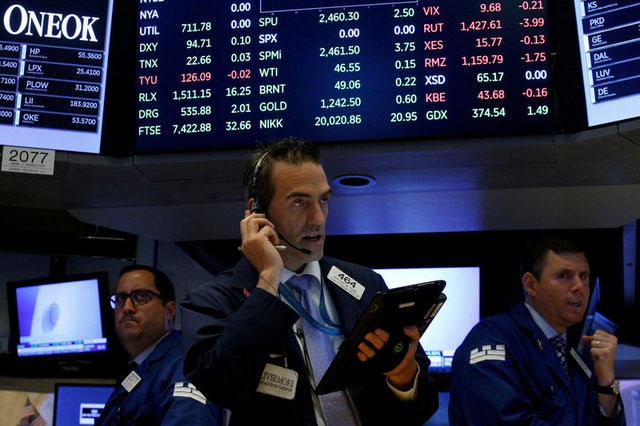By Saikat Chatterjee and Kit Rees
LONDON (Reuters) - Stock prices climbing ever higher as interest rates and volatility plumb rock bottom: for some of the world's top asset managers, the investment outlook is as good as it gets.
But look closer and clouds are forming that may put a dampener on this sunny outlook. Investors should beware a rise in bond yields, a downturn in economic data or a policy misstep in a large emerging market.
As the big money managers outline their recommendations for the rest of 2017, several have highlighted stocks and local currency emerging market debt as likely winners.
The reasons aren't difficult to find.
A collapse in market volatility to record lows across currencies, fixed income and equities means carry trade strategies, in which investors borrow in a low-yielding currency to invest in a higher-yielding one, have proven very rewarding.
The JPMorgan (NYSE:JPM) emerging market currency index is up more than 8.5 percent this year, on track for its best yearly performance since 2010, according to Thomson Reuters data.
A structural decline in inflation despite years of monetary stimulus pursued by the world's biggest central banks has also meant that holding cash or government bonds would actually leach money from portfolios.
Strategists at Bank of America Merrill Lynch (NYSE:BAC) estimate inflation is rising in only 11 percent of developed markets compared with 72 percent in February.
Small wonder that some investors believe these may be the best conditions to buy equities as the biggest industrialized economies are enjoying low but persistent growth, near full-employment and declining inflation.
EARNINGS
A favorite chart with investment houses is the growing premium offered by earnings yields over bond yields. At a chunky 6 percent, it suggests investors would do well to buy stocks.
With earnings recovering and interest rates at record lows, Blackrock (NYSE:BLK) strategists say they see "less reason" to expect equity valuation metrics to fall back to historical means in such a world.
But portfolio managers such as Julian Chillingworth, CIO of Rathbone Unit Trust Management, say substantial flows into European stocks from exchange-traded funds and passive investors have pushed valuations to a point where they are beginning to look a bit stretched.
"We feel that we’ve seen some very good economic data, but wonder whether or not we may be close to a peak in this series of economic data and so consequently we could see the economy not dipping dramatically, but rolling over," he said.
Deutsche Bank equity strategists say the recent surge in European purchasing manager indexes (PMIs) is not supported by lending surveys or other data, suggesting economic momentum may weaken in the coming months and weigh on equities.
Fading economic momentum combined with rising bond yields would be the worst possible combination for equities as it could squeeze that gap between stock and bond yields.
German 10-year bond yields have doubled to more than 53 basis points in the last month and may rise further if the European Central Bank does more to lay the ground for the withdrawal of its policy stimulus.
POCKETS OF EXUBERANCE
Whatever the reason for their caution, investors are buying downside protection in markets even as global stock markets scale record highs.
An analysis of more than 400 global equity and European active fund holdings by Barclays (LON:BARC) strategists indicates conviction levels among fund managers are low and cash levels high relative to historical averages, indicating some scepticism about the sustainability of the market rally.
And portfolio managers at Wells Fargo (NYSE:WFC) Asset Managers pointed to a gap between the record low in the CBOE's VIX "fear gauge" of implied volatility in the S&P 500 U.S. stocks index and its SKEW index, which indicates what investors are paying to protect themselves against the risk of a big sell-off.
"Even though implied volatility is very low, the VIX skew on the implied probability of a large move down in equity prices is historically quite high – which shows market less ‘complacent’ than you may think," they said.
But pockets of unabashed exuberance exist.
For example, 12-month price-to-earnings multiples in India are above 18 times, more than one standard deviation over their long-term median, indicating markets may be frothy and vulnerable if the central bank misreads inflation data and cuts interest rates aggressively, potentially fuelling a bubble.
Some parts of the global credit markets remain richly valued: a JPMorgan index of global emerging market debt trading near its lowest levels on record while Deutsche Bank (DE:DBKGn) strategists say downside protection on German stocks are at record lows.
"Investors have already made double digit returns on their portfolios this year and now is a good time to take some money off the table rather than add positions into a potentially volatile period," said a strategist at an Asian private bank in Hong Kong.

(This version of the story was refiled to add dropped letters in first paragraph)